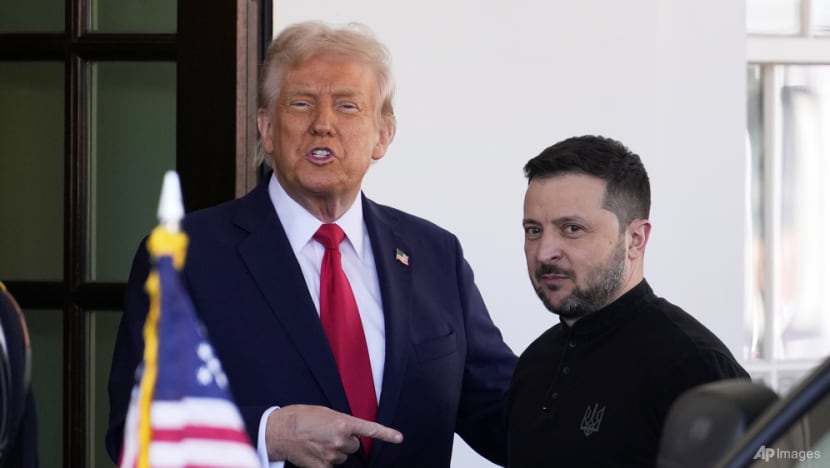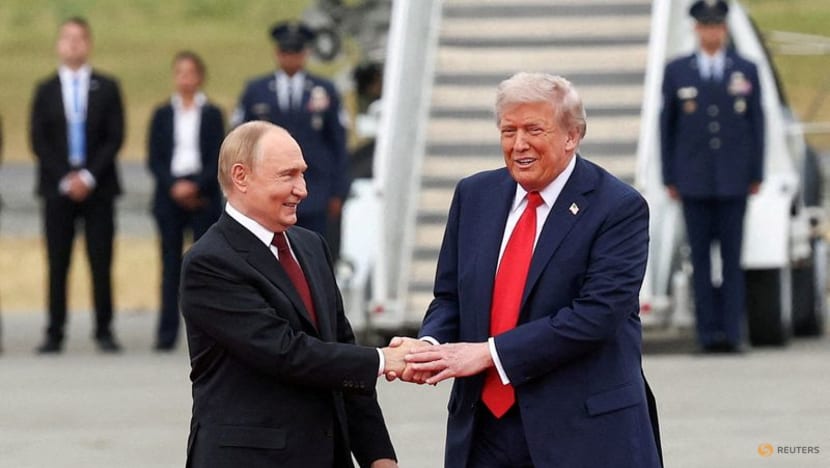European leaders to join Zelenskyy in Trump meeting
The leaders heading to Washington on Monday to appear alongside Zelenskyy call themselves the "coalition of the willing".

US President Donald Trump welcomes Ukraine President Volodymyr Zelenskyy at the White House in Washington, Feb 28, 2025. (Photo: AP Photo/Ben Curtis)
BRUSSELS: European leaders said they would join Ukrainian President Volodymyr Zelenskyy in talks with US President Donald Trump on Monday (Aug 18), as they try to find a way to end Russia's offensive.
Trump met Russian President Vladimir Putin in Alaska on Friday, but the talks failed to yield any breakthrough on a ceasefire – though White House envoy Steve Witkoff said both leaders had agreed to provide "robust security guarantees" to Ukraine.
European Commission chief Ursula von der Leyen hailed the news but Zelenskyy, speaking alongside her at a news conference in Brussels, rejected the idea of Russia offering his country security guarantees.
"What President Trump said about security guarantees is much more important to me than Putin's thoughts, because Putin will not give any security guarantees," he said.
Zelenskyy later said on social media that the US offer regarding security guarantees was "historic".
MOSCOW DENOUNCES MACRON
French President Emmanuel Macron, who will take part in the Washington meeting along with von der Leyen and others, said European leaders would ask about the extent of the security guarantees offered to Ukraine in any peace agreement.
Of Moscow's position, he said: "There is only one state proposing a peace that would be a capitulation: Russia."
Russian foreign ministry spokeswoman Maria Zakharova called that an "abject lie" in a statement on Telegram later Sunday.
Moscow had been proposing a "peaceful resolution" of the conflict for seven years under the terms of the Minsk Accords, she said.
Macron, she added, was trying to convince Ukraine that it could win on the battlefield even when he knew that that was "impossible".
HOPES FOR "PRODUCTIVE MEETING"
Trump, who pivoted after the Alaska meeting to say he was now seeking a peace deal rather than a ceasefire, on Sunday posted "BIG PROGRESS ON RUSSIA. STAY TUNED!" on his Truth Social platform, without elaborating.
Trump's sudden focus on a peace deal aligns with the stance long taken by Putin, one which Ukraine and its European allies have criticised as Putin's way to buy time while trying to make battlefield gains.
Zelenskyy also said he saw "no sign" the Kremlin leader was prepared to meet him and Trump for a three-way summit, as had been floated by the US president.

The leaders heading to Washington on Monday to appear alongside Zelenskyy call themselves the "coalition of the willing".
As well as von der Leyen and Macron, they include British Prime Minister Keir Starmer, German Chancellor Friedrich Merz and NATO Secretary-General Mark Rutte.
Also heading to Washington will be Italian Prime Minister Giorgia Meloni and Finnish President Alexander Stubb, who get on well with Trump.
On Sunday they all held a video meeting to prepare their joint position.
Speaking to US broadcaster CNN, Witkoff said: "I'm hopeful that we have a productive meeting on Monday, we get to real consensus, we're able to come back to the Russians and push this peace deal forward and get it done."
US Secretary of State Marco Rubio, speaking to NBC on Sunday, warned of "consequences", including the potential imposition of new sanctions on Russia, if no peace deal was reached on Ukraine.
Peter Layton, visiting fellow at Griffith University's Griffith Asia Institute, told CNA's Asia First that Monday's meeting will be critical to see if NATO can stand as one, given that the US is a major nation in the alliance.
He noted Putin's keenness to split up NATO as well as keeping the US and Europe apart.
"Trump appears to be influenced by the person he is talking to, and Putin was obviously very influential as far as discussing Russia's needs," Layton added.
"So, it's quite possible that nothing will, in fact, come out of this meeting, except exactly the same - the Ukrainians will very likely push back, and Trump won't perhaps be that strong or that aggressive when there's several other European leaders in the room."
TERRITORIAL "CONCESSIONS"
European leaders have expressed unease from the outset over Trump's outreach to Putin, who has demanded Ukraine abandon its ambitions to join the EU or NATO. They were excluded from Trump's summit with Putin.
Witkoff, in his CNN interview, said the process of offering "game-changing" security guarantees would involve territorial "concessions".
According to an official briefed on a call Trump held with Zelenskyy and European leaders as he flew back from Alaska, the US leader supported a Putin proposal that Russia take full control of two eastern Ukrainian regions in exchange for freezing the frontline in two others.
Putin "de facto demands that Ukraine leave Donbas", an area consisting of the Donetsk and Lugansk regions in eastern Ukraine, which Russia currently only partly controls, the source said.
In exchange, Russian forces would halt their offensive in the Black Sea port region of Kherson and Zaporizhzhia in southern Ukraine, where the main cities are still under Ukrainian control.
Several months into its full-scale invasion of Ukraine, Russia in September 2022 claimed to have annexed all four Ukrainian regions even though its troops still do not fully control any of them.
"The Ukrainian president refused to leave Donbas," the source said.
Donbas is important from a strategic and economic perspective due to its status as a coal and mineral hub. These include critical minerals that Kyiv in April signed an agreement with Trump to mine, noted Layton.
Meanwhile, the conflict in Ukraine rages on, with both Kyiv and Moscow launching attack drones at each other on Sunday.














